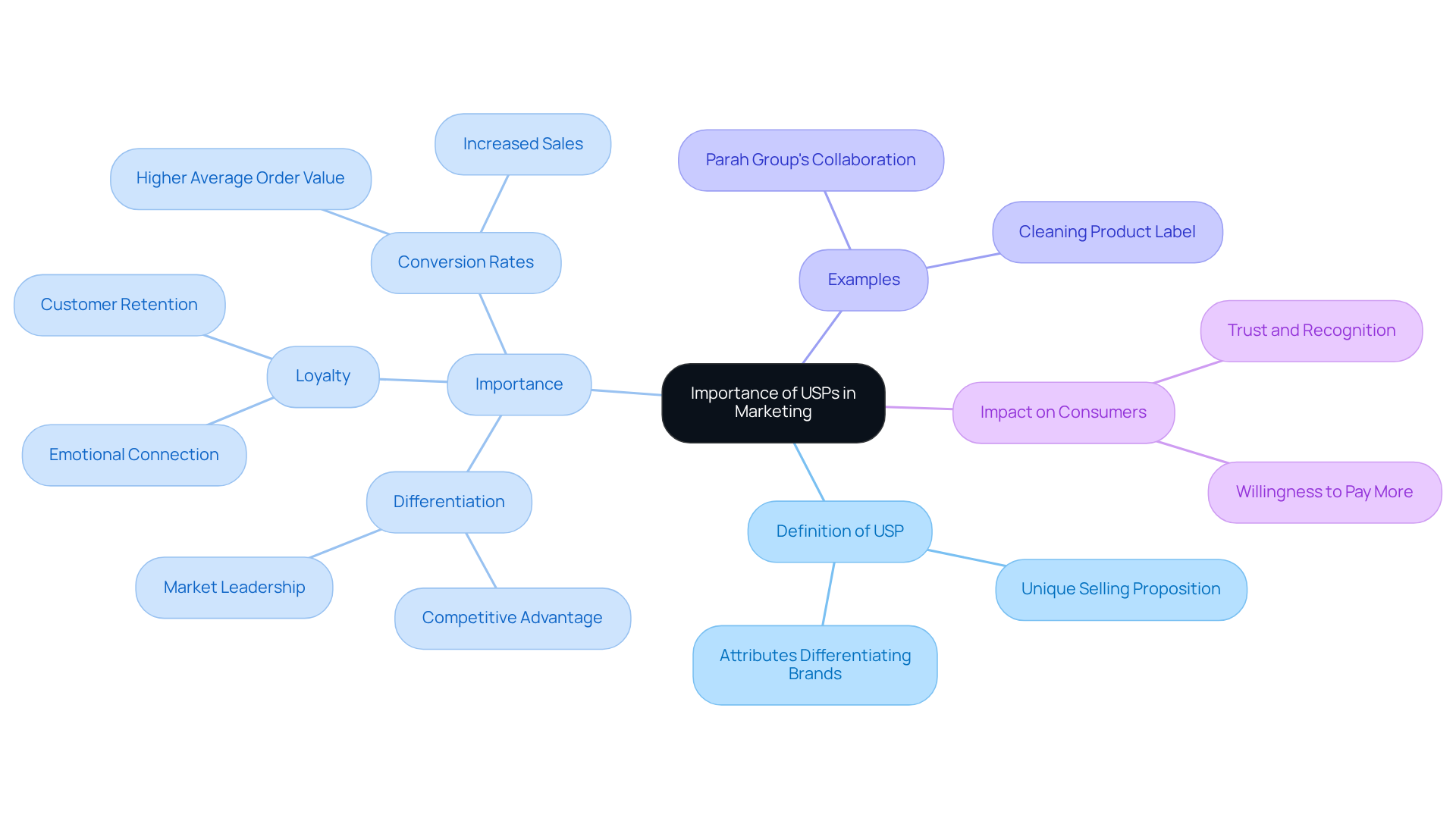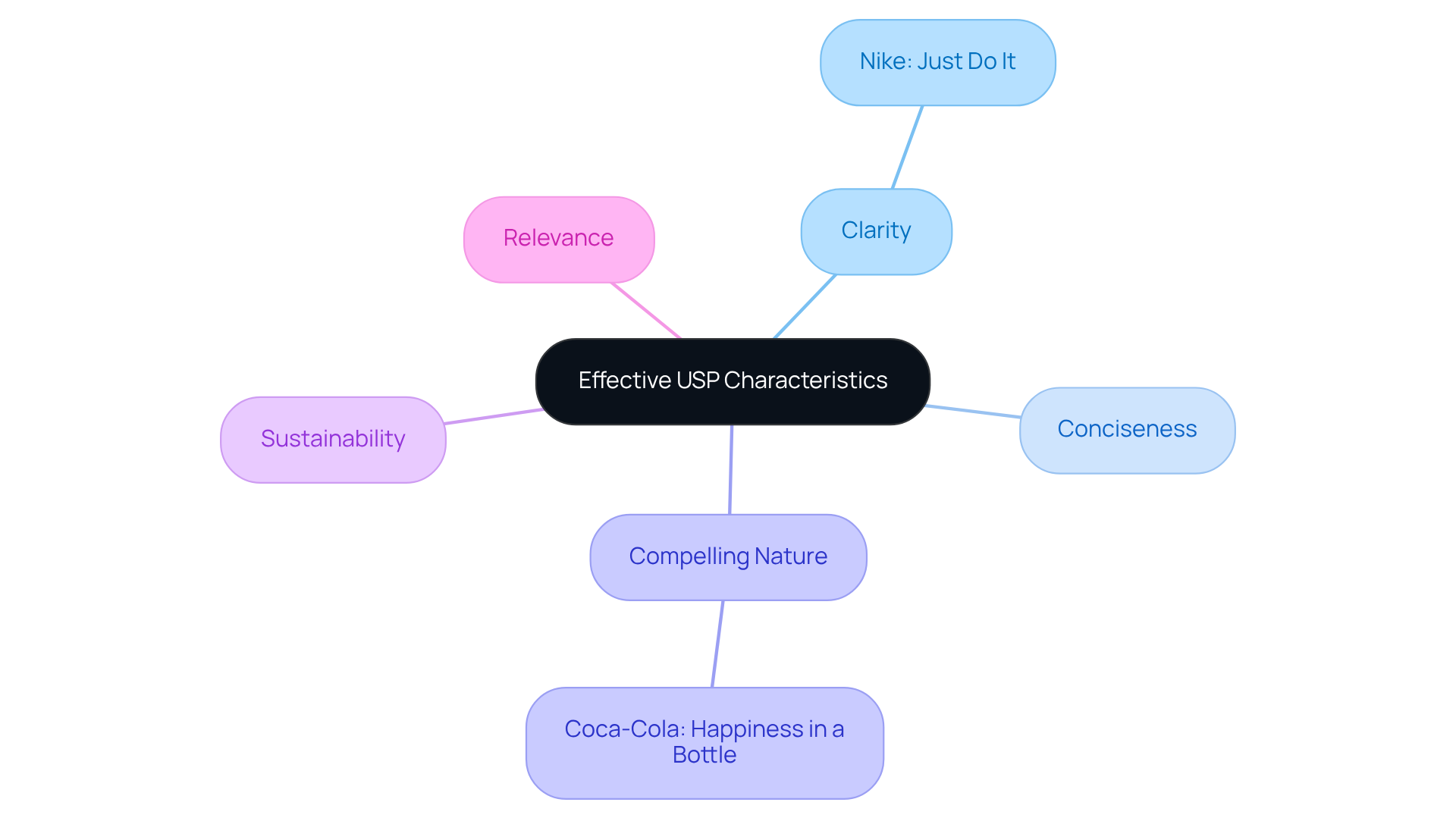
Overview
The Unique Selling Proposition (USP) serves as a pivotal element in marketing for Direct-to-Consumer (DTC) brands. It embodies the distinct feature or benefit that sets a company apart from its competitors, a crucial factor in capturing consumer attention and fostering loyalty. A well-defined USP not only drives conversions but also enhances customer retention, positioning companies as market leaders. This is substantiated by compelling statistics that reveal increased customer lifetime value and improved conversion rates.
To illustrate, companies that effectively communicate their USP often experience significant engagement from their target audience. The data indicates that brands with a strong USP see a marked increase in customer loyalty, which translates into sustained revenue growth. By establishing a clear and compelling USP, DTC brands can differentiate themselves in a crowded marketplace, ultimately leading to greater market share and consumer trust.
In conclusion, the significance of a well-articulated USP cannot be overstated. It is essential for DTC brands to not only identify their unique advantages but also to communicate them effectively to their audience. This strategic focus not only enhances brand visibility but also cultivates a loyal customer base, driving long-term success.
Introduction
In a marketplace overflowing with choices, the Unique Selling Proposition (USP) stands as a crucial instrument for brands aiming to differentiate themselves. For Direct-to-Consumer (DTC) companies, grasping and articulating their USP is not simply beneficial; it is imperative for capturing consumer interest and nurturing loyalty.
But what precisely constitutes an effective USP, and how can brands harness it to excel in a competitive arena? This analysis delves into the intricacies of USPs in marketing, illuminating their pivotal role in driving engagement and fostering success for DTC brands.
Define Unique Selling Proposition (USP)
The meaning of USP in marketing is the distinct feature or benefit that sets a company apart from its competitors in the marketplace. It explains the meaning of USP in marketing by articulating what makes a product or service unique and why consumers should choose it over alternatives. The concept of USP was championed by advertising innovator Rosser Reeves in the 1940s, who underscored the necessity for products to convey a clear, persuasive reason for consumers to make a purchase.
For Direct-to-Consumer (DTC) companies, the meaning of USP in marketing is not just beneficial; it is essential. In a crowded market, capturing consumer attention is paramount. Understanding the meaning of USP in marketing not only drives conversions but also fosters customer loyalty. By clearly communicating what differentiates their offerings, DTC brands can effectively engage their target audience, ensuring they stand out amidst the competition.

Explain the Importance of USPs in Marketing
The meaning of USP in marketing is essential, serving as a beacon for companies navigating a crowded marketplace. A well-defined USP articulates the unique advantages a company offers, which is essential for understanding the meaning of USP in marketing and enabling it to resonate with specific target audiences. For instance, a direct-to-consumer label that emphasizes its use of sustainable materials can effectively attract environmentally conscious shoppers, setting itself apart from competitors. This differentiation is vital, as 70% of consumers are willing to pay more for products that deliver unique benefits, emphasizing the financial implications of the meaning of USP in marketing.
Moreover, the meaning of USP in marketing fosters loyalty by creating a distinctive identity that consumers can connect with on an emotional level. Research indicates that customers with an emotional attachment to a product exhibit three times greater lifetime value, underscoring the importance of a memorable USP in customer retention. As companies aim to boost their conversion rates, the meaning of USP in marketing can significantly enhance both conversion rates and average order values, establishing it as a core component of successful marketing strategies. For example, Parah Group's collaboration with a $30M clothing label involved optimizing their homepage to showcase social proof and reviews, resulting in a 35% increase in conversion rates and a 10% rise in revenue per visitor. Similarly, a $15M cleaning product label experienced an 80% increase in average order value through strategic bundling and pricing tests.
In fact, companies that understand the meaning of USP in marketing are 53% more likely to be perceived as market leaders, demonstrating the competitive advantage that a strong USP can provide. As Ashley Deland asserts, 'Your USP should communicate your value to the customer,' thereby emphasizing the meaning of USP in marketing and its critical role in effective strategies. Parah Group's innovative Conversion Rate Optimization (CRO) strategies not only drive revenue growth but also enhance profitability, reinforcing the significance of USPs in the direct-to-consumer landscape.

Identify Key Characteristics of an Effective USP
The meaning of USP in marketing is an effective Unique Selling Proposition that embodies several critical characteristics: clarity, conciseness, and a compelling nature. Clarity guarantees that the message is easily grasped by the audience, while conciseness facilitates swift communication of the unique advantages. The meaning of USP in marketing suggests that a compelling USP should evoke an emotional response or address a specific need or pain point of the target audience. For instance, a subscription service for organic snacks may highlight convenience and health advantages as its unique selling proposition, effectively attracting health-conscious individuals seeking easy solutions.
Moreover, the meaning of USP in marketing indicates that a successful USP must be sustainable and relevant over time, adapting to market changes while preserving its core message. Companies like Nike, with its iconic 'Just Do It' slogan, exemplify how a clear and memorable USP can foster strong loyalty and recognition. Similarly, Coca-Cola's positioning of its product as 'happiness in a bottle' resonates emotionally with consumers, reinforcing its market presence.
To assess the effectiveness of a USP in marketing, companies should understand the meaning of USP in marketing by monitoring client acquisition and retention rates, as these metrics offer valuable insights into how well the USP connects with the target audience. Regularly soliciting and analyzing customer feedback is also crucial for refining the USP, ensuring it remains relevant in a dynamic market environment. Tools such as SEMrush and Google Analytics can aid DTC companies in examining competitors' strategies, assisting them in recognizing distinctive advantages that can be utilized in their own USPs.
By focusing on these characteristics and integrating quantitative measures, DTC brands can craft USPs that illustrate the meaning of USP in marketing, which not only resonate with consumers but also drive engagement and loyalty, ultimately enhancing their competitive edge in a crowded marketplace.

Conclusion
Understanding the Unique Selling Proposition (USP) is crucial for direct-to-consumer brands striving to differentiate themselves in a competitive marketplace. A well-defined USP not only highlights what makes a product or service unique but also serves as a persuasive tool that encourages consumer loyalty and drives purchasing decisions. By clearly communicating their unique advantages, DTC brands can effectively engage their target audiences and establish a strong market presence.
A compelling USP must possess clarity, conciseness, and the ability to evoke an emotional connection with consumers. Successful brands, such as Nike and Coca-Cola, illustrate how leveraging their USPs fosters brand loyalty and recognition. Furthermore, the financial implications of a well-articulated USP are significant; studies show that consumers are willing to pay more for products that deliver unique benefits. By focusing on the key characteristics of an effective USP, companies can enhance their customer acquisition and retention rates, ultimately leading to increased revenue and market leadership.
The importance of a Unique Selling Proposition cannot be overstated for DTC brands. Crafting a strong USP is not merely a marketing tactic; it is a strategic necessity that shapes brand identity and influences consumer behavior. As the marketplace continues to evolve, brands must remain vigilant in refining their USPs to ensure they resonate with their audiences. By doing so, they can attract new customers and build lasting relationships that drive long-term success.
Frequently Asked Questions
What does USP stand for in marketing?
USP stands for Unique Selling Proposition, which refers to the distinct feature or benefit that sets a company apart from its competitors.
Why is USP important in marketing?
USP is important because it articulates what makes a product or service unique and provides consumers with a compelling reason to choose it over alternatives.
Who popularized the concept of USP?
The concept of USP was popularized by advertising innovator Rosser Reeves in the 1940s.
How does USP benefit Direct-to-Consumer (DTC) companies?
For DTC companies, USP is essential as it helps capture consumer attention in a crowded market, drives conversions, and fosters customer loyalty.
How can DTC brands effectively communicate their USP?
DTC brands can effectively communicate their USP by clearly articulating what differentiates their offerings to engage their target audience and stand out from the competition.
FAQs











